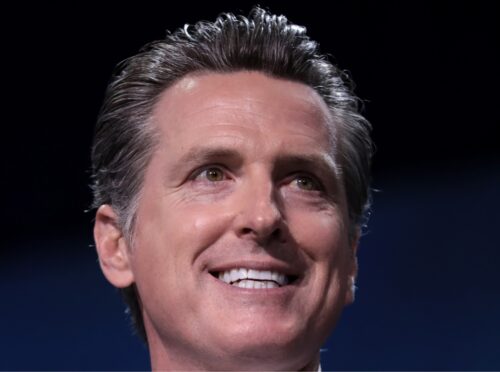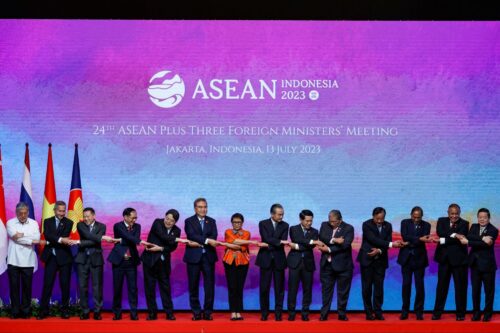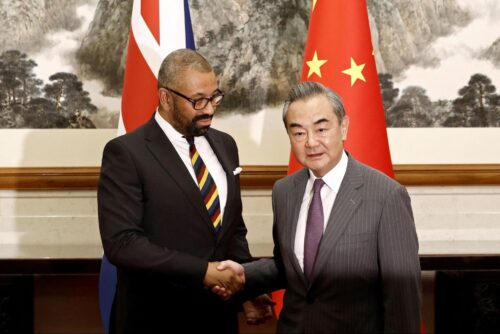U.S. snubs EU, announces defense deal with Australia and Britain to counter China
The U.S., Australia, and Britain’s new trilateral military alliance, designed to counter China partly by giving nuclear-powered submarines to Australia, came as a shock to the EU and France.

Yesterday evening, U.S. President Biden, Australian Prime Minister Scott Morrison, and British Prime Minister Boris Johnson made an unexpected joint announcement that they were forming a new trilateral military alliance: AUKUS.
- China was not mentioned by name, but the framing of the alliance as “Indo-Pacific” — English-language government speak for a less Chinese Asia-Pacific — makes the overarching goal clear.
- The key initial commitment of giving Australia nuclear-powered submarines, which the New York Times notes could enable the nation to “begin conducting routine patrols that could move through areas of the South China Sea that Beijing claims as its exclusive zone and range as far north as Taiwan,” also makes the intention to counter China obvious.
- The deal also aims to enhance cooperation on a “broad array of new military technologies, including artificial intelligence, quantum computing, hypersonic missiles, cyberweapons and new undersea systems,” per the Washington Post.
China is not happy
“The nuclear submarine cooperation between the U.S., the U.K. and Australia has seriously undermined regional peace and stability, intensified the arms race and undermined international non-proliferation efforts…This is extremely irresponsible,” said Chinese foreign ministry spokesperson Zhào Lìjiān 赵立坚 (in English, Chinese).
Australian leader Scott Morrison vowed that his country is “not seeking to acquire nuclear weapons or establish a civil nuclear capability,” and Biden and Johnson both emphasized that the submarines would be nuclear-powered, but not nuclear-armed.
- However, the technology that the U.S. is poised to share with Australia does rely on “bomb-grade, highly enriched uranium” — and American officials acknowledged that they were making an “exception to the effort to reduce the use of weapons-grade nuclear fuel,” the New York Times says.
- Australia is only the second country that the U.S. has agreed to share nuclear submarine technology with after Britain. And though four other countries have nuclear-power submarines — France, China, India, and Russia — all of those are also nuclear-armed states, making Australia doubly an exception, per NBC.
France furious, EU embarrassed
The country most blindsided and upset by the deal, however, was France, which had made a deal to supply Australia with a new, conventionally powered submarine fleet back in 2016. That $40 billion deal is now off.
- It’s like a “knife in the back,” Foreign Affairs Minister Jean-Yves Le Drian said, adding that the American role in the decision was “brutal, unilateral, unpredictable” and “looks very much like what Mr. Trump used to do.”
- “It’s the worst transatlantic blow-up since the Iraq war,” Politico said, attributing the decision to America’s “increasing signs of frustration with the EU’s softer approach to China.”
- See more in the NYT: France is outraged by U.S. nuclear submarine deal with Australia.
The European Union was also “not aware” of the deal before it was announced, foreign policy chief Josep Borrell said. The Financial Times described it as a “wake-up call for EU and France about their waning influence in post-Cold War world,” and quoted an official who said, “of course it’s embarrassing…[it’s] another example of how Europe might be rich but isn’t powerful.”
- Borrell “said the new partnership…showed the need for a more assertive European foreign policy,” Reuters reports.
- And so, on cue: “The European Union on Thursday unveiled a new strategy for boosting economic, political and defense ties in the Indo-Pacific, just hours after the United States, Britain and Australia announced a new security alliance likely to reshape their relations with the vast region,” per AP.
- See also, on The China Project: EU challenges China’s Belt and Road Initiative with global infrastructure program.
China news, weekly.
Sign up for The China Project’s weekly newsletter, our free roundup of the most important China stories.






